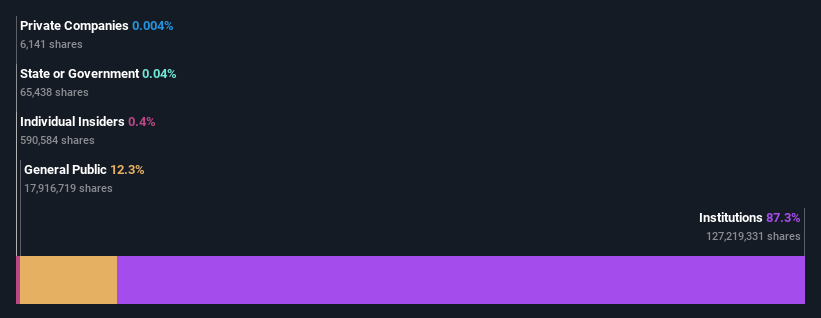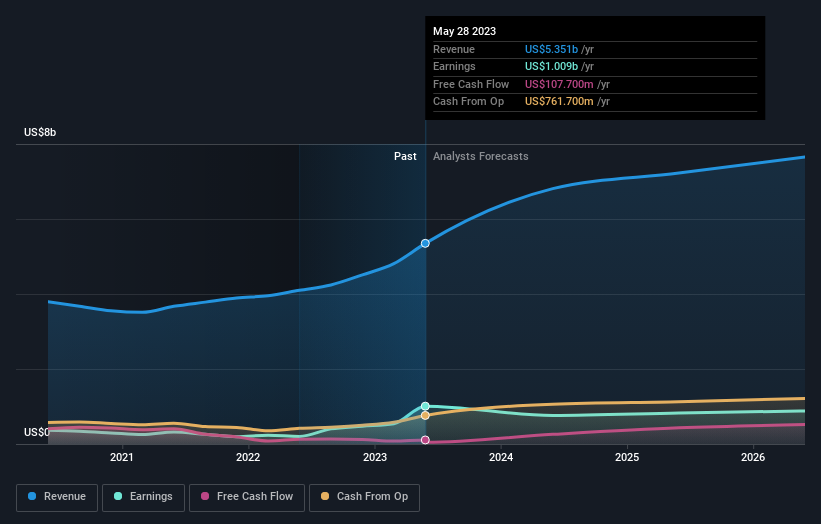- United States
- /
- Food
- /
- NYSE:LW
With 87% ownership, Lamb Weston Holdings, Inc. (NYSE:LW) boasts of strong institutional backing

Key Insights
- Institutions' substantial holdings in Lamb Weston Holdings implies that they have significant influence over the company's share price
- 51% of the business is held by the top 21 shareholders
- Using data from analyst forecasts alongside ownership research, one can better assess the future performance of a company
If you want to know who really controls Lamb Weston Holdings, Inc. (NYSE:LW), then you'll have to look at the makeup of its share registry. And the group that holds the biggest piece of the pie are institutions with 87% ownership. In other words, the group stands to gain the most (or lose the most) from their investment into the company.
Because institutional owners have a huge pool of resources and liquidity, their investing decisions tend to carry a great deal of weight, especially with individual investors. As a result, a sizeable amount of institutional money invested in a firm is generally viewed as a positive attribute.
Let's take a closer look to see what the different types of shareholders can tell us about Lamb Weston Holdings.
See our latest analysis for Lamb Weston Holdings

What Does The Institutional Ownership Tell Us About Lamb Weston Holdings?
Many institutions measure their performance against an index that approximates the local market. So they usually pay more attention to companies that are included in major indices.
Lamb Weston Holdings already has institutions on the share registry. Indeed, they own a respectable stake in the company. This can indicate that the company has a certain degree of credibility in the investment community. However, it is best to be wary of relying on the supposed validation that comes with institutional investors. They too, get it wrong sometimes. When multiple institutions own a stock, there's always a risk that they are in a 'crowded trade'. When such a trade goes wrong, multiple parties may compete to sell stock fast. This risk is higher in a company without a history of growth. You can see Lamb Weston Holdings' historic earnings and revenue below, but keep in mind there's always more to the story.

Institutional investors own over 50% of the company, so together than can probably strongly influence board decisions. We note that hedge funds don't have a meaningful investment in Lamb Weston Holdings. The Vanguard Group, Inc. is currently the company's largest shareholder with 12% of shares outstanding. BlackRock, Inc. is the second largest shareholder owning 7.6% of common stock, and State Street Global Advisors, Inc. holds about 4.0% of the company stock.
A closer look at our ownership figures suggests that the top 21 shareholders have a combined ownership of 51% implying that no single shareholder has a majority.
While studying institutional ownership for a company can add value to your research, it is also a good practice to research analyst recommendations to get a deeper understand of a stock's expected performance. There are a reasonable number of analysts covering the stock, so it might be useful to find out their aggregate view on the future.
Insider Ownership Of Lamb Weston Holdings
While the precise definition of an insider can be subjective, almost everyone considers board members to be insiders. The company management answer to the board and the latter should represent the interests of shareholders. Notably, sometimes top-level managers are on the board themselves.
I generally consider insider ownership to be a good thing. However, on some occasions it makes it more difficult for other shareholders to hold the board accountable for decisions.
Our data suggests that insiders own under 1% of Lamb Weston Holdings, Inc. in their own names. It is a very large company, so it would be surprising to see insiders own a large proportion of the company. Though their holding amounts to less than 1%, we can see that board members collectively own US$55m worth of shares (at current prices). It is always good to see at least some insider ownership, but it might be worth checking if those insiders have been selling.
General Public Ownership
The general public-- including retail investors -- own 12% stake in the company, and hence can't easily be ignored. This size of ownership, while considerable, may not be enough to change company policy if the decision is not in sync with other large shareholders.
Next Steps:
It's always worth thinking about the different groups who own shares in a company. But to understand Lamb Weston Holdings better, we need to consider many other factors. To that end, you should learn about the 3 warning signs we've spotted with Lamb Weston Holdings (including 2 which shouldn't be ignored) .
If you are like me, you may want to think about whether this company will grow or shrink. Luckily, you can check this free report showing analyst forecasts for its future.
NB: Figures in this article are calculated using data from the last twelve months, which refer to the 12-month period ending on the last date of the month the financial statement is dated. This may not be consistent with full year annual report figures.
New: AI Stock Screener & Alerts
Our new AI Stock Screener scans the market every day to uncover opportunities.
• Dividend Powerhouses (3%+ Yield)
• Undervalued Small Caps with Insider Buying
• High growth Tech and AI Companies
Or build your own from over 50 metrics.
Have feedback on this article? Concerned about the content? Get in touch with us directly. Alternatively, email editorial-team (at) simplywallst.com.
This article by Simply Wall St is general in nature. We provide commentary based on historical data and analyst forecasts only using an unbiased methodology and our articles are not intended to be financial advice. It does not constitute a recommendation to buy or sell any stock, and does not take account of your objectives, or your financial situation. We aim to bring you long-term focused analysis driven by fundamental data. Note that our analysis may not factor in the latest price-sensitive company announcements or qualitative material. Simply Wall St has no position in any stocks mentioned.
About NYSE:LW
Lamb Weston Holdings
Engages in the production, distribution, and marketing of frozen potato products in the United States, Canada, Mexico, and internationally.
Good value with reasonable growth potential.
Similar Companies
Market Insights
Community Narratives




